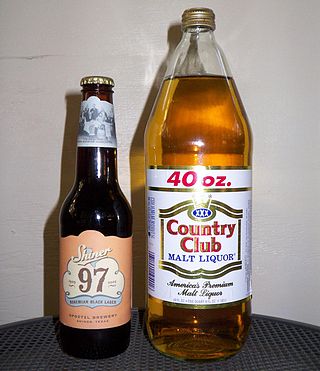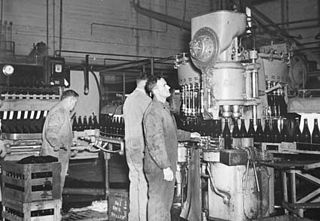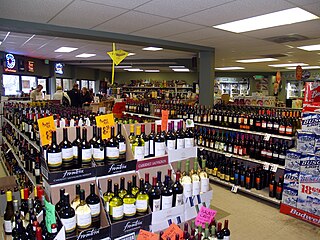
Prohibition is the act or practice of forbidding something by law; more particularly the term refers to the banning of the manufacture, storage, transportation, sale, possession, and consumption of alcoholic beverages. The word is also used to refer to a period of time during which such bans are enforced.

A bar, also known as a saloon, a tavern or tippling house, or sometimes as a pub or club, is an establishment retail business that serves alcoholic beverages, such as beer, wine, liquor, cocktails, and other beverages such as mineral water and soft drinks. Bars often also sell snack foods, such as crisps or peanuts, for consumption on their premises. Some types of bars, such as pubs, may also serve food from a restaurant menu. The term "bar" refers to the countertop where drinks are prepared and served, and by extension to the overall premises.

Buckfast Tonic Wine is a caffeinated alcoholic drink consisting of fortified wine with added caffeine, originally made by monks at Buckfast Abbey in Devon, England. It is now made under a licence granted by the monastery, and distributed by J. Chandler & Company in Great Britain, James E McCabe Ltd in Northern Ireland, and Richmond Marketing Ltd in Ireland. It is based on a traditional recipe from France. The wine's distributor reported record sales of £43.2 million as of March 2017.

A shot glass is a glass originally designed to hold or measure spirits or liquor, which is either imbibed straight from the glass or poured into a cocktail. An alcoholic beverage served in a shot glass and typically consumed quickly, in one gulp, may also be known as a "shooter" or “shot”.

Malt liquor is a type of mass market beer with high alcohol content, most closely associated with North America. Legally, it often includes any alcoholic beverage with 5% or more alcohol by volume made with malted barley. In common usage, it refers to beers of high alcohol content, generally above 6%, which are made with ingredients and processes resembling those for American-style lagers.

Beer arrived in Australia at the beginning of British colonisation. In 2004 Australia was ranked fourth internationally in per capita beer consumption, at around 110 litres per year; although, the nation ranked considerably lower in a World Health Organization report of alcohol consumption per capita of 12.2 litres. Lager is by far the most popular type of beer consumed in Australia.

A pint glass is a form of drinkware made to hold either a British imperial pint of 20 imperial fluid ounces (568 ml) or an American pint of 16 US fluid ounces (473 ml). Other definitions also exist, see below. These glasses are typically used to serve beer, and also often for cider.

A liquor store is a retail business that predominantly sells prepackaged alcoholic beverages, including liquors, wine or beer, usually intended to be consumed off the store's premises. Depending on region and local idiom, they may also be called an off-licence, off-sale, bottle shop, bottle store or, colloquially, bottle-o, liquor store or other similar terms. A very limited number of jurisdictions have an alcohol monopoly. In US states that are alcoholic beverage control (ABC) states, the term ABC store may be used.

A liquor license is a governmentally issued permit for businesses to sell, manufacture, store, or otherwise use alcoholic beverages.

An Australian pub or hotel is a public house or pub for short, in Australia, and is an establishment licensed to serve alcoholic drinks for consumption on the premises. They may also provide other services, such as entertainment, meals and basic accommodation.

Alcoholic drinks in Sweden are as common as in most of the Western world. Sweden is historically part of the vodka belt, with high consumption of distilled drinks and binge drinking, but during the later half of the 20th century, habits are more harmonized with western Europe, with increasing popularity of wine and weekday drinking. Wine is now also grown and produced in several parts of Sweden and the southernmost region of Skåne is turning into a hub experiencing a strong growth in number of active vineyards.

A drinking establishment is a business whose primary function is the serving of alcoholic beverages for consumption on the premises. Some establishments may also serve food, or have entertainment, but their main purpose is to serve alcoholic beverages. There are different types of drinking establishment ranging from seedy bars or nightclubs, sometimes termed "dive bars", to 5,000 seat beer halls and elegant places of entertainment for the elite. A public house, informally known as a "pub", is an establishment licensed to serve alcoholic drinks for consumption on the premises in countries and regions of British influence. Although the terms are increasingly used to refer to the same thing, there is a difference between pubs, bars, inns, taverns and lounges where alcohol is served commercially. A tavern or pot-house is, loosely, a place of business where people gather to drink alcoholic beverages and, more than likely, also be served food, though not licensed to put up guests. The word derives from the Latin taberna and the Greek ταβέρνα/taverna.

An alcoholic beverage is a beverage containing alcohol. Alcoholic drinks are typically divided into three classes—beers, wines, and spirits—and typically their alcohol content is between 3% and 50%.

The alcohol laws of Utah regulate the selling and purchasing of alcohol in the U.S. state of Utah and are some of the most restrictive in the United States. A person must be 21 years old or older to buy or consume alcohol. The Utah Department of Alcoholic Beverage Services (UDABS) has regulated the sale of alcoholic beverages since 1935, two years after the end of Prohibition. Utah is one of seventeen control states, meaning the state has a monopoly over the wholesaling and/or retailing of some or all categories of alcoholic beverages.
Alcohol laws of Australia are laws that regulate the sale and consumption of alcoholic beverages. The legal drinking age is 18 throughout Australia. The minimum age for the purchase of alcoholic products in Australia is 18. A licence is required to produce or sell alcohol.

Alcohol has been consumed in New Zealand since the arrival of Europeans. The most popular alcoholic beverage is beer. The legal age to purchase alcohol is 18. New Zealand has an above average consumption rate of alcohol, in 2016 ranking 32nd globally in per-capita total alcohol consumption.

Alcohol laws are laws relating to manufacture, use, being under the influence of and sale of alcohol or alcoholic beverages. Common alcoholic beverages include beer, wine, (hard) cider, and distilled spirits. Definition of alcoholic beverage varies internationally, e.g., the United States defines an alcoholic beverage as "any beverage in liquid form which contains not less than one-half of one percent of alcohol by volume". Alcohol laws can restrict those who can produce alcohol, those who can buy it, when one can buy it, labelling and advertising, the types of alcoholic beverage that can be sold, where one can consume it, what activities are prohibited while intoxicated, and where one can buy it. In some cases, laws have even prohibited the use and sale of alcohol entirely.

Social customs and laws concerning drinking alcohol in public vary significantly around the world. "Public" in this context refers to outdoor spaces such as roads, walkways or parks, or in a moving vehicle. Drinking in bars, restaurants, stadiums, and other such establishments, for example, is not generally considered to be "in public" even though those establishments are open to the general public. In some countries, such as Norway, Poland, India and Sri Lanka, some states in the United States, as well as Muslim-majority countries where alcohol is legal, public drinking is almost universally condemned or outlawed, while in other countries, such as Portugal, Spain, Germany, the United Kingdom, New Zealand, Japan, Finland and China, public drinking is socially acceptable.

















